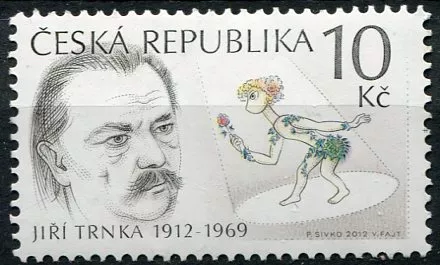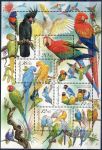- Home
- Philately: postage stamps
- Philately: stamps of the Czech Republic
- Czech Republic
- Net
- 2012
- (2012) MiNo. 709 ** - Czech Republic - Jiří Trnka
(2012) MiNo. 709 ** - Czech Republic - Jiří Trnka (1912-1969), artist
Czech Republic - postage stamps

| Code: | CZ-710 |
| Producer: | Česká republika |
| Price: | 0,52 EUR |
| Availability: | In Stock |
| Stock: | 1 Pcs |
| Denomination of the stamp: | 10 Kč |
| Year: | 2012 |
| Condition: | ** |
| Cat. number (POFIS): | 710 |
| Catalogue no. (MICHEL): | 709 |
| Cat. number (St. Gibbons): | 676 |
| Cat. number (Yvert et Tellier): | 628 |
Jiří Trnka - biography and works
Jiří Trnka (1912-1969) is one of the most important Czech artists of the 20th century. His work influenced not only illustration and set design, but especially the world of animation, where he is often called the "Walt Disney of the East". His approach to puppet animation, his emphasis on artistic stylization and his often existential themes made him a unique artist even internationally.
Artistic beginnings
Trnka graduated from the School of Applied Arts in Prague, where he was among the pupils of Professor Jaroslav Benda. Already in his youth he was interested in puppets, drawing and scenography. His first major successes came as an illustrator of children's books - his works for fairy tales by Božena Němcová, K. J. Erben and the Brothers Grimm are still considered the pinnacle of Czech book illustration.
Illustration and scenography
Illustrations were an integral part of Trnka's life. They were characterized by precise drawing, attention to detail and sensitive stylization. In addition to children's literature, he also worked in stage design, especially in theatres such as the National Theatre and the Liberated Theatre. His stage design was often based on artistic rhythm, harmony and a distinctive atmosphere.
The Road to Animation
In the 1940s, he co-founded the Brothers in Trick studio, where classic cartoons were made. Trnka directed several films there, but soon began to focus exclusively on puppet animation. In 1947 he founded his own Puppet Film Studio (later part of Krátký film Praha), which became the centre of Czech animation.
Key Film Works
Among his most celebrated films are The Palisade (1947), which presents a mosaic of folk motifs and traditions, and The Emperor's Nightingale (1948), which combines animation with live acting. The highlight of Trnka's film work, however, are later films such as The Old Czech Tales (1953), A Midsummer Night's Dream (1959), based on Shakespeare, and above all The Hand (1965), an allegorical film about the freedom of artistic creation, which was immediately banned after its premiere.
Link
Jiří Trnka died in 1969, but his work lives on - not only in his book illustrations and animated films, but also in the way he transformed the way we look at puppetry. Whereas previously the puppet was seen primarily as a tool for a child audience, Trnka elevated it to a medium capable of expressing complex ideas and emotions. His work continues to inspire animators, illustrators and artists around the world today.
Frequently Bought Together - (2012) MiNo. 709 ** - Czech Republic - Jiří Trnka (1912-1969), artist
From the Same Category - (2012) MiNo. 709 ** - Czech Republic - Jiří Trnka (1912-1969), artist
Coupon 2 ( K1 + 1 + K2)
Hungary - postage stamps Michelangelo Buonarroti (1475-1564): the genius of Renaissance art Michelangelo Buonarroti was born on 6 March 1475 in Caprese, near Arezzo. He is one of the most important figures of the Italian Renaissance, not only as a ...
Czech Republic postage stamps
